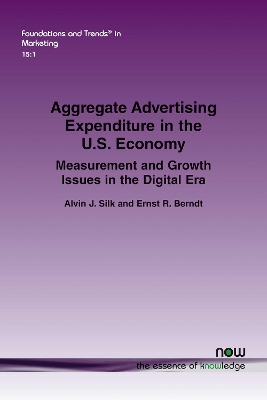Aggregate Advertising Expenditure in the U.S. Economy provides evidence that over the period 2000 through 2018 nominal aggregate advertising spending in the U.S. as a share of nominal GDP has been falling. The elasticity of advertising with respect to nominal GDP appears to have increased substantially since the late 1990s. The authors further show that nominal aggregate advertising spending has become more responsive to changes in real GDP and GDP price inflation. Finally, the monograph considers the implications of ongoing developments in the management of advertising campaigns and pending public policy issues surrounding controversial digital advertising practices for how advertising’s macroeconomic role may evolve in the future. The authors stress the development of media-specific and aggregate media mix prices indices as being the critical next step in advancing understanding of the sensitivity of aggregate spending on advertising to cyclical and secular shifts in total economic activity and the components thereof. Following a short introduction, section II provides some historical background on the twin problems of defining advertising in the face of its ever-changing boundaries and measuring its output as a service industry. Section III sketches the vertical structure of the U.S. advertising industry and describes the set of four time series assembled that measure nominal aggregate advertising spending by advertisers and the related revenues of two sectors who function as service providers to advertisers -- advertising agencies and media firms. Section IV reviews the media price indices available from private sector sources and the BLS. Section V presents the double log constant elasticity model that serves as the conceptual framework underlying the analysis of the relationship of nominal aggregate adverting spending to GDP. Section VI reports extensive analyses of autocorrelation and partial autocorrelation coefficients calculated in order to assess whether the measures of nominal advertising spending exhibit stationarity and guide our choice of the order of moving average autoregressive function specifications. Section VII presents the results indicating that a structural shift in the sensitivity of nominal aggregate advertising to GDP occurred around the turn of the century when, in nominal terms, aggregate ad spending became more responsive to not only changes in nominal GDP but also to changes in real GDP and to changes in GDP inflation. Section VIII discusses implications of changes in the management of advertising campaigns accompanying the ascendancy of digital media and the resolution of public policy issues surrounding digital advertising practices. Section IX summarizes the main conclusions.
- ISBN13 9781680838725
- Publish Date 2 September 2021
- Publish Status Active
- Publish Country US
- Imprint now publishers Inc
- Format Paperback
- Pages 96
- Language English
- URL https://nowpublishers.com/article/Details/MKT-074
